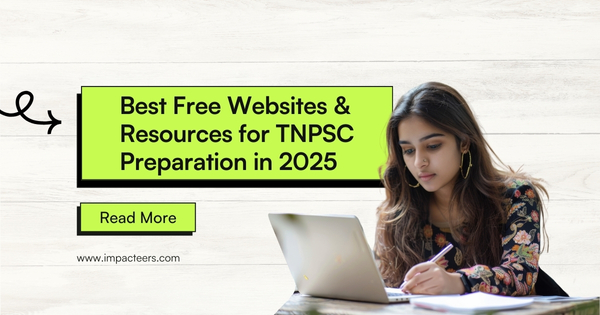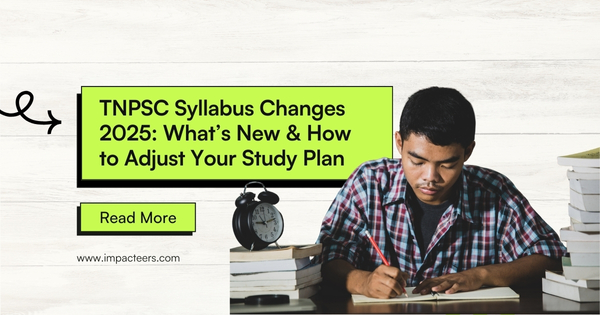In today’s hyper-competitive environment, government jobs in India remain a top choice for graduates, especially those with backgrounds in engineering, computer science, or general disciplines. Whether it’s Central services like SSC, banking, and UPSC, or state-level roles such as TNPSC and other Tamil Nadu commissions, aspirants often prepare for multiple government exams simultaneously. But here’s the real challenge: staying consistent.
Balancing varied syllabi, multiple exam dates, and personal responsibilities can shake even the most determined candidates. In this blog, we’ll walk through proven strategies to stay grounded and consistent throughout your prep—without burning out. And if you’re just starting or feeling stuck, you’ll be glad to know platforms like Impacteers now offer dedicated courses for freshers and graduates preparing for government jobs in 2025.
Why Preparing for Multiple Government Exams Is So Challenging
Each exam has its own nuances:
- UPSC demands deep understanding of current affairs and analytical writing.
- SSC and Railway exams focus more on quantitative aptitude and reasoning.
- State government exams like those in Tamil Nadu demand local knowledge, language proficiency, and general awareness.
- For engineering and computer graduates, the inclusion of technical sections adds another layer of pressure.
When you’re tackling 2–4 of these simultaneously, fatigue can creep in fast. That’s why staying consistent isn’t just important—it’s essential for survival and success.
1. Define Your Core Focus Areas Across Exams
Before diving into books or apps:
- List the common subjects across the exams you’re targeting.
- Identify overlapping topics like General Studies, Quantitative Aptitude, Reasoning, and Computer Knowledge.
- Group exams into categories: Technical (GATE, SSC JE) vs Non-Technical (SSC CGL, TNPSC, Bank PO).
This step is especially useful for engineering and computer graduates who might be juggling both types of exams.
2. Build a Smart, Flexible Study Schedule
Creating a rigid schedule often leads to burnout. Instead:
- Block 6-8 hours daily with focused slots for common and unique subjects.
- Rotate topics based on urgency—if an exam is approaching, give it more time.
- Every 3-4 days, revisit topics shared across exams to build strong fundamentals.
Consistency isn’t about studying 12 hours a day—it’s about showing up every single day, even for 2 hours, with purpose.
3. Master the Art of Micro-Planning
Instead of planning entire months, break it down into:
- Weekly goals: Cover 2–3 chapters per subject.
- Daily objectives: Specific question sets, reading assignments, revision blocks.
- Use sticky notes, digital planners, or apps like Notion or Evernote.
Graduates prepping for multiple government exams in 2025 can especially benefit from micro-planning. It gives you the freedom to adjust without losing sight of your ultimate goals.
4. Choose Resources That Serve Multiple Exams
Some candidates also align these resources with TNPSC coaching for guided coverage of Tamil Nadu–specific topics. To avoid overloading your shelves and brain:
- Opt for books and resources that cover broad topics—e.g., Lucent’s GK, R.S. Aggarwal’s aptitude books, Arihant’s reasoning guides.
- For engineering grads, GATE-level materials like Made Easy also help with SSC JE, ISRO, and DRDO.
- For computer students, Disha or Arihant’s Computer Awareness works across exams.
If you’re unsure which resources are optimized for multiple exams, check out curated Impacteers courses. Their materials are handpicked to overlap with various govt exam patterns.
5. Use One Notebook for Each Subject, Not Each Exam
Here’s a small but powerful tip:
- Maintain subject-wise notebooks: one each for GK, Aptitude, Reasoning, English, Computer.
- Divide each notebook into Common Notes and Exam-Specific Notes.
This format keeps your study material clean and accessible. It also saves you time and reinforces retention—key elements of staying consistent.
6. Regular Revision is Your Best Friend
It’s common to learn something and forget it 10 days later. Solution?
- Allocate 30% of your weekly schedule for revision.
- Use the Feynman technique—explain what you learn in simple terms.
- Build quick-reference notes, cheat sheets, and flashcards for common facts.
Revision keeps knowledge active and reduces your burden as exams get closer.
7. Attend Structured Learning Programs (Like Impacteers Courses)
Sometimes, the best way to stay consistent is to stay accountable.
Impacteers runs multi‑exam preparation courses designed specifically for 2025 graduates and freshers:
- Weekly topic schedules
- Timed tests and feedback
- Peer discussions and community support
Joining such a program keeps your efforts aligned and prevents procrastination. When everyone around you is working hard, you naturally do too.
8. Take Weekly Mock Tests with Proper Analysis
Mock tests aren’t just for practice—they’re for identifying gaps.
- Schedule one full-length mock test every 7–10 days.
- Focus on post-test analysis: What went wrong? Why? Which subjects were weak?
- Use this data to tweak your next week’s schedule.
Platforms like Impacteers include test series that mimic state, central, and technical exam styles, giving a rounded prep experience.
9. Don’t Forget Physical & Mental Health
Staying consistent requires energy—and that energy comes from health:
- Sleep at least 6–7 hours daily.
- Eat clean, stay hydrated, and avoid excessive caffeine.
- Practice deep breathing, meditation, or light walks during breaks.
You’re preparing for the long game. Burnout in April means no results in June.

10. Stay Updated on Latest Vacancy Notifications
One overlooked area is the motivation that comes from knowing what’s at stake:
- Follow government portals like UPSC, SSC, TNPSC, and IBPS.
- Subscribe to newsletters, Telegram groups, or join Impacteers notification groups to get alerts on latest vacancies.
- Create a monthly tracker with dates, eligibility, and deadlines.
When you see opportunities coming, it becomes easier to stay driven and consistent.
11. Take Breaks Without Guilt
Taking a day off doesn’t mean you’re inconsistent. In fact, planned rest is part of a consistent routine.
- Pick one day a week to avoid heavy topics.
- Use it to revisit notes, catch up on news, or join motivational sessions by platforms like Impacteers.
Your brain resets, and you return sharper the next day.
12. Connect with Other Serious Aspirants
Find your tribe. Consistency thrives in community:
- Join study groups—online or offline.
- Share schedules, quizzes, and resources.
- Discuss concepts together and solve doubts.
Impacteers offers discussion forums and peer-driven quizzes, keeping the energy high and the focus sharper.
13. Reflect, Reset, and Realign Every Month
At the end of each month:
- Review your progress. How many hours? How many chapters? How many mocks?
- Ask: What’s working? What’s not?
- Adjust your plan—don’t get stuck in the wrong direction.
Consistency is about growth. And growth needs reflection.
Conclusion
Consistency is not a talent—it’s a strategy. When you plan smart, pick the right materials, follow a flexible schedule, and stay motivated through platforms like Impacteers, your journey through multiple government exams becomes manageable and even enjoyable.
Whether you’re from Tamil Nadu, targeting Central vacancies, or a fresh engineering graduate, the competition in 2025 is real—but so is your ability to pass it with focus. Remember, it’s not about doing everything in a day; it’s about showing up every day.
Learn More >>> https://blog.impacteers.com
About Us >>> https://www.impacteers.com
Frequently Asked Questions (FAQs)
Q1: Is it possible to prepare for multiple government exams at the same time?
A1: Yes, especially if you identify overlapping subjects like GK, aptitude, and reasoning. The key is to plan well, revise often, and avoid burnout.
Q2: Which books work best across multiple exams like SSC, TNPSC, and bank PO?
A2: Lucent GK, R.S. Aggarwal for Quant, Arihant for reasoning and computer awareness, and newspaper reading help across most Central and state exams.
Q3: How do I stay consistent for months without losing focus?
A3: Set small weekly goals, join a study community like Impacteers courses, take mock tests, and reward your milestones. Progress, even small, builds long-term motivation.
Q4: What are the benefits of using Impacteers courses for government exam prep?
A4: Impacteers offers structured curriculums for freshers and graduates, aligned with 2025 exam trends. Their live classes, test series, and mentoring boost both consistency and confidence.
Q5: I’m a computer engineering graduate. Can I handle both technical and general exams?
A5: Absolutely. Start with common subjects, then build technical depth. Use GATE or SSC JE material and balance it with general studies using resources mentioned above.



Post Comment